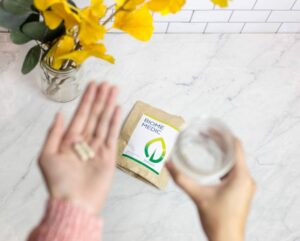Most of us go about our daily lives without considering the hidden chemicals we might be ingesting. Yet, pesticides—chemicals used to kill pests that harm crops—are present in almost all of the food we eat here in the United States. These chemicals can end up in our bodies, building up over time and potentially causing serious health issues, including cancer, hormone disruption, and neurological disorders.
Now, imagine being able to significantly reduce the pesticide levels in your body in just one week. It might sound almost too good to be true, but a groundbreaking peer-reviewed study found that switching to an organic diet can achieve precisely that. After less than a week of eating organic food, participants experienced an average drop of 60.5% in pesticide and pesticide metabolite levels. Let’s dive into the science behind this significant health benefit and explore why organic food is more than just a luxury—it’s a crucial choice for your health and the environment.
The Science Behind the Numbers
In another study, researchers collected urine samples from four diverse American families after they consumed their typical conventional diet for six days and then after a controlled diet of all organic food for six days. The results were striking: the levels of several harmful pesticides dropped dramatically in just one week of eating organic.
Key findings of the study include:
- 61% drop in chlorpyrifos: A neurotoxic pesticide known to damage children’s developing brains.
- 95% drop in malathion: Another neurotoxic pesticide and a probable human carcinogen.
- 83% drop in clothianidin: A neonicotinoid pesticide associated with endocrine disruption.
- 43-57% drop in pyrethroids: A class of pesticides linked to adverse neurodevelopmental, immunological, and reproductive effects.
- 37% drop in 2,4-D: One of the main ingredients in Agent Orange, associated with endocrine disruption and increased risk of non-Hodgkin’s lymphoma.
The Impact of Pesticide Reduction
Reducing pesticide exposure can have profound health benefits. Pesticides like organophosphates are highly neurotoxic and have been linked to a range of health issues, including brain damage in children, autism, cancers, autoimmune disorders, infertility, and hormone disruption. The study highlights how quickly and significantly these dangerous substances can be reduced in our bodies through dietary changes.
Breaking the Myths: Organic is Not “Bougie”
Many people still perceive organic food as a luxury or a trend for the “bougie.” However, the term “organic” essentially means food produced without the use of synthetic pesticides, such as glyphosate (the main ingredient in RoundUp), which has been linked to various health problems. By choosing organic, you are opting for food that is free from these potentially harmful chemicals.
Moreover, organic farming practices promote biodiversity, improve soil health, and reduce pollution, making it a more sustainable choice for the environment. Organic farming uses natural processes to build soil fertility and control pests, which is better for the planet and us.
The Dark Side of Industrial Farming: Poisoning the Population
Industrial farming in the United States has a dark side that many are not aware of: the rampant use of pesticides that poison the population. The history of pesticide use in agriculture dates back to the early 20th century when chemicals like DDT were widely adopted. While these pesticides were initially hailed as revolutionary for increasing crop yields, it soon became clear that they came with significant health and environmental costs.
The effects of pesticide exposure are not limited to those who work directly with these chemicals. Residues of pesticides can be found on conventionally grown produce, in our water supply, and even in the air we breathe. This pervasive exposure has been linked to a host of chronic diseases, including cancer, endocrine disruption, and neurodevelopmental disorders in children.
Regenerative Organic Farming: A Return to Nature
Regenerative organic farming offers a stark contrast to industrial agriculture. This method focuses on farming practices that restore and enhance the health of the soil, promote biodiversity, and improve the overall ecosystem. Unlike conventional farming, which relies heavily on chemical inputs, regenerative organic farming uses natural processes to build soil fertility and control pests.
Regenerative farming practices include crop rotation, cover cropping, composting, and reduced tillage. These methods help sequester carbon in the soil, reduce greenhouse gas emissions, and increase the resilience of crops to pests and diseases. Moreover, regenerative farming enhances the nutritional quality of the food produced, making it healthier for consumers.
Soil Health: The Foundation of Sustainable Agriculture
Soil health is a critical component of regenerative organic farming. Healthy soil is teeming with life, including bacteria, fungi, earthworms, and other organisms that contribute to nutrient cycling and soil structure. Industrial farming practices, such as monocropping and heavy pesticide use, degrade soil health by killing these beneficial organisms and depleting the soil of essential nutrients.
Topsoil, the uppermost layer of soil that is richest in organic matter and nutrients, is being lost at an alarming rate due to industrial farming practices. According to the Food and Agriculture Organization (FAO), we have lost about one-third of the world’s topsoil in the last 150 years. This loss not only reduces the fertility of the land but also increases the vulnerability of crops to pests and diseases, leading to a vicious cycle of increased pesticide use.
Regenerative organic farming, on the other hand, builds topsoil and enhances soil health. Practices such as cover cropping and composting add organic matter to the soil, improving its structure, water-holding capacity, and nutrient content. This not only boosts crop yields but also makes the farming system more resilient to climate change and other environmental stresses.
Local and Organic: The Best of Both Worlds
While choosing organic is crucial, sourcing locally grown organic produce can further enhance the benefits. Locally grown produce is typically fresher, as it doesn’t have to travel long distances to reach your plate. Fresher produce retains more nutrients and tastes better, providing both health and culinary benefits.
Local organic farms also support the local economy and promote sustainable agricultural practices. By purchasing from local farmers, you can also have more transparency about how your food is grown, ensuring that it meets the highest quality and sustainability standards.
Practical Tips for Going Organic
Transitioning to an organic diet doesn’t have to be overwhelming or expensive. Here are some practical tips to help you make the switch:
Prioritize High-Risk Produce: Start by switching to organic for the most pesticide-laden fruits and vegetables, such as strawberries, spinach, kale, and apples. The Environmental Working Group (EWG) releases an annual “Dirty Dozen” list highlighting the produce with the highest pesticide residues.
Shop Local: Visit farmers’ markets or join a local CSA (Community Supported Agriculture) to get fresh, seasonal, and often more affordable organic produce.
Grow Your Own: If you have the space, consider growing your own organic vegetables. Even a small garden or a few pots on a balcony can provide a steady supply of fresh, organic produce.
Buy in Bulk: Purchase organic grains, nuts, and seeds in bulk to save money and reduce packaging waste.
Cook at Home: Preparing meals at home allows you to control the ingredients and ensure that you eat organic food. It can also be a fun and rewarding experience.
Support Your Gut Health with Purium’s Biome Medic
While adopting an organic diet is a fantastic step towards reducing your pesticide exposure, supporting your gut health with the right supplements can enhance these benefits. One of the best supplements I’ve found for maintaining a healthy gut is Purium’s Biome Medic.
What is Biome Medic?
 Purium’s Biome Medic is a specially formulated supplement designed to support a balanced gut microbiome. Its unique combination of prebiotics and probiotics helps maintain the health of your gut flora, essential for optimal digestive health.
Purium’s Biome Medic is a specially formulated supplement designed to support a balanced gut microbiome. Its unique combination of prebiotics and probiotics helps maintain the health of your gut flora, essential for optimal digestive health.
Understanding the Microbiome
The microbiome is a community of microorganisms living in our intestines, often called the “second brain” because it communicates with the rest of our body, influencing many vital functions. This complex ecosystem of bacteria and other microbes plays a crucial role in our health.
Functions of the Microbiome
 The microbiome is responsible for:
The microbiome is responsible for:
- Nutrient Absorption: It helps break down food and absorb nutrients effectively.
- Toxin Removal: It aids in detoxifying harmful substances from our bodies.
- Immune Support: It is integral to the function of our immune system, protecting us against pathogens.
When the microbiome is out of balance or compromised, it can lead to a weakened immune system and poor digestion, among other health issues.
Challenges to the Microbiome
Several factors can disrupt the microbiome, including the overuse of antibiotics, poor diet, and exposure to pesticides like glyphosate. These disruptions can lead to decreased gut health, impacting overall well-being.
How Biome Medic Helps
Biome Medic contains a blend of ingredients that support and restore gut health:
- Prebiotics and Probiotics: These essential components help nourish beneficial bacteria and maintain a healthy balance in the gut.
- Wheat Germ Extract: Known for its prebiotic properties, it supports the growth of healthy bacteria.
- Chicory Root Fiber: This natural fiber promotes digestive health and nutrient absorption.
- Fulvic and Humic Acid: These compounds help detoxify the gut and enhance the strength of the intestinal lining.
- Bacillus Coagulans: A resilient probiotic strain that supports digestion and helps eliminate toxins.
Safe for All Ages
Biome Medic is safe for both adults and children, making it a versatile supplement for the whole family. It helps improve digestion, boost immunity, and promote overall well-being.
User Experience
Many users of Biome Medic report better digestion, enhanced nutrient absorption, and increased energy levels. It’s a simple yet effective way to support your gut health daily.
How to Use
For daily maintenance, take one capsule in the morning and one in the evening with water. For optimal results, you can start with a higher dose of four capsules per day for the first month.
Conclusion: Take the Organic Challenge
Switching to an organic diet for just one week can significantly reduce the levels of harmful pesticides in your body, as demonstrated by the study published in Environmental Research. The benefits extend beyond personal health, contributing to a more sustainable and environmentally friendly food system.
Choosing organic is not just about avoiding pesticides; it’s about embracing a lifestyle that promotes overall well-being, supports sustainable agriculture, and protects the environment. So why not take the one-week organic challenge and see the difference for yourself? Your body, and the planet, will thank you.













